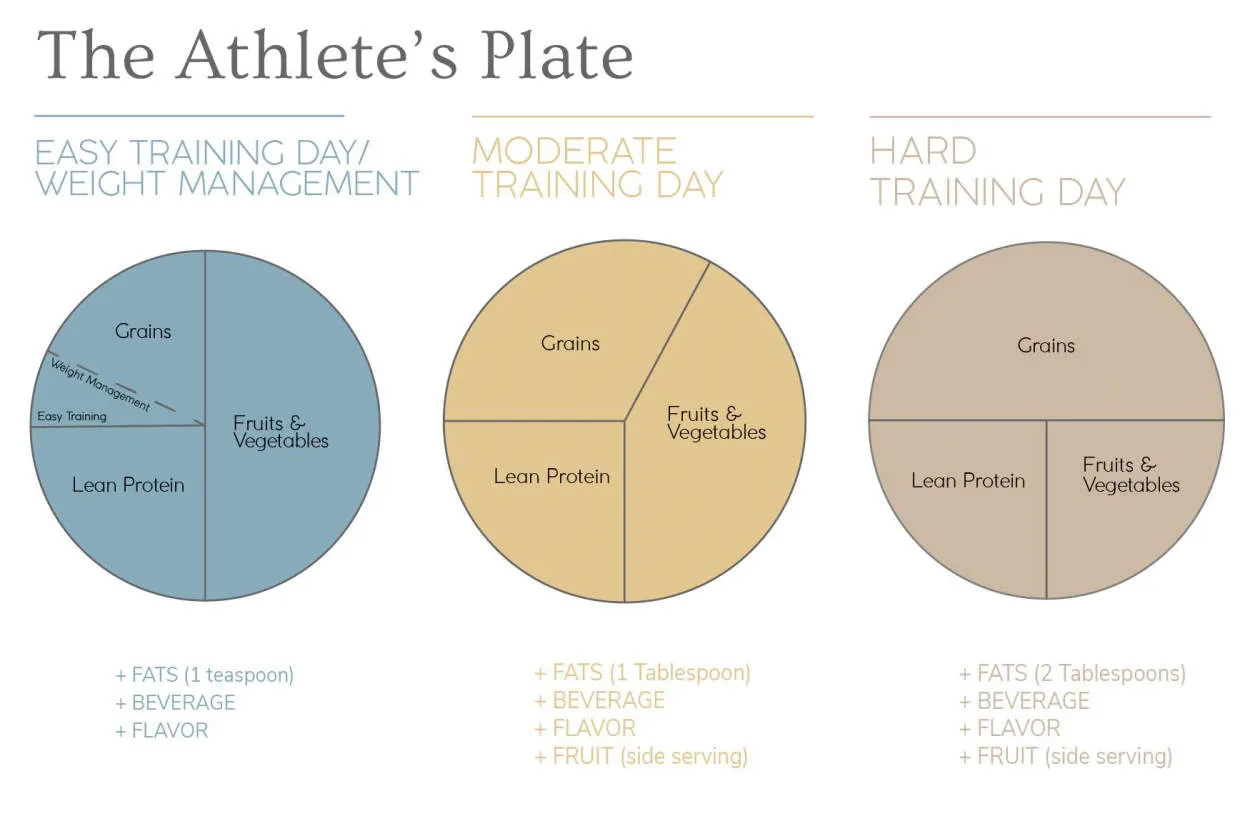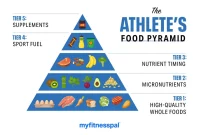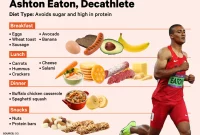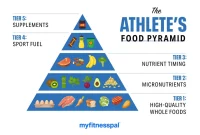An effective meal planning plays a vital role in an athlete’s performance. This article provides a comprehensive guide on how athletes can plan their meals to optimize energy levels, enhance recovery, and meet their nutritional needs for peak performance.
Strategies for Balanced Meal Prepping
Effective meal planning is crucial for athletes to ensure they have the energy and nutrients needed to perform at their best. Here are some strategies to help athletes create balanced meal prepping routines:
1. Set Clear Goals
Identify your specific athletic goals and tailor your meal prep accordingly. Whether you aim to build muscle, increase endurance, or maintain weight, your diet should support these goals.
2. Focus on Whole Foods
Include a variety of whole foods, such as lean proteins, fruits, vegetables, whole grains, and healthy fats in your meal prep. These nutrient-dense foods provide the necessary vitamins, minerals, and antioxidants for optimal performance.
3. Plan for Nutrient Timing
Consider the timing of your workouts and schedule nutrient-rich meals and snacks accordingly. Consuming carbohydrates before a workout can provide energy, while protein after exercise aids in muscle recovery and growth.
4. Portion Control
Pay attention to portion sizes to meet your calorie needs. Use measuring cups or a food scale to ensure you consume the right amount of each food group. This helps prevent overeating or undereating, which can negatively impact performance.
5. Pre-Prep Ingredients
To make meal prepping more efficient, pre-prep ingredients like chopping vegetables, marinating meats, or cooking grains in advance. This saves time during busy periods and helps maintain consistency in your meal plan.
6. Incorporate Variety and Flavor
Include a wide range of flavors, textures, and colors in your meals to keep things interesting and enjoyable. Experiment with different herbs, spices, and healthy sauces to add depth to your meals.
7. Stay Hydrated
Hydration is vital for athletic performance. Include plenty of water in your meal prep routine, and consider adding electrolyte-rich beverages or foods, especially during intense training sessions.
The Importance of Meal Timing for Athletes
Proper meal timing is a crucial aspect of an athlete’s overall nutrition plan. By strategically structuring meals around training sessions and competitions, athletes can optimize their performance, support recovery, and enhance overall well-being.
1. Pre-Workout Nutrition:
Consuming a balanced meal or snack before a workout is essential to provide the body with the necessary fuel. Ideally, athletes should consume a combination of carbohydrates and protein about 1-3 hours prior to exercise. This helps to top up glycogen stores, enhance energy levels, and improve endurance.
2. Post-Workout Nutrition:
After an intense training session, it’s crucial to replenish the body’s glycogen stores and provide it with the necessary nutrients for muscle repair. Consuming a meal or snack containing carbohydrates and protein within 30-60 minutes post-workout can promote muscle recovery, reduce muscle soreness, and facilitate future performance.
3. Meal Distribution Throughout the Day:
Athletes should aim to consume smaller, well-balanced meals every 3-4 hours throughout the day. This steady distribution of meals helps to maintain stable blood sugar levels, sustain energy levels, and support muscle repair and growth. Fueling the body consistently throughout the day also improves metabolism and aids in weight management.
4. Bedtime Snack:
For athletes looking to optimize recovery during sleep, a small protein-rich bedtime snack can be beneficial. This helps to provide amino acids to the muscles overnight, reducing muscle breakdown and supporting muscle repair.
5. Hydration:
Proper hydration is crucial for athletes to maintain optimal performance. It is important to consume fluids before, during, and after exercise to replenish lost fluids and electrolytes. Water is usually sufficient for shorter exercises, while sports drinks may be necessary for longer or more intense workouts.
By paying attention to meal timing, athletes can optimize their training, improve performance, and support overall health. Each athlete is unique, so it is essential to experiment with different strategies and consult with a sports nutritionist to develop a personalized meal plan that suits individual needs and goals.
In the world of athletic performance, maintaining a proper diet is crucial to achieving peak results. However, individuals with dietary restrictions may face challenges in effectively planning their meals. Whether you have food allergies, intolerances, or follow a specific diet plan, here are some tips to help you navigate your dietary restrictions while optimizing your athletic performance.
1. Know your restrictions
Understanding your dietary restrictions is the first step towards effective meal planning. Consult with a healthcare professional or a registered dietitian to identify foods to avoid or limit based on your individual needs.
2. Educate yourself
Take the time to research and educate yourself about alternative food options that align with your dietary restrictions. Familiarize yourself with ingredients to look out for and explore new recipes and meal ideas that cater to your specific needs.
3. Plan ahead
Meal planning is vital when facing dietary restrictions. Dedicate some time each week to plan your meals in advance. This will allow you to ensure you have the necessary ingredients and avoid any last-minute compromises that may not align with your restrictions.
4. Seek professional guidance
If you’re unsure about how to effectively navigate your dietary restrictions, don’t hesitate to consult with a nutritionist or a registered dietitian. They can provide personalized guidance and help you develop meal plans that meet your athletic needs while considering your restrictions.
5. Experiment and adapt
Don’t be afraid to experiment with new ingredients and recipes that fit within your dietary restrictions. This can open up a world of exciting flavors and help you stay motivated in maintaining a balanced and nutritious diet.
6. Stay organized
Keep track of your dietary requirements, meal plans, and shopping lists. This will help you stay organized and minimize the chances of accidentally consuming foods that may interfere with your athletic performance or overall well-being.
By understanding your restrictions, educating yourself, planning ahead, seeking guidance, experimenting, and staying organized, you can effectively navigate your dietary restrictions as an athlete. Always remember that your dietary needs are unique, and finding the right balance between restrictions and optimal performance may require some trial and error.
Seasonal Eating for Optimal Performance
When it comes to effective meal planning for athletes, incorporating seasonal eating into your diet can significantly enhance your performance. Consuming foods that are in season not only provides you with fresh and nutritious options, but also brings variety to your meals. Here are some reasons why seasonal eating is important for athletes:
Freshness and Nutritional Value
Seasonal fruits and vegetables are typically harvested at their peak ripeness, meaning they are packed with essential vitamins, minerals, and antioxidants. These nutrients are crucial for supporting your energy levels, boosting recovery, and strengthening your immune system.
Flavor and Taste
When you choose foods that are in season, you are more likely to enjoy their natural flavors. Freshly harvested produce tends to have a richer taste, which can make your meals more satisfying and enjoyable. This encourages a positive relationship with food and helps you stick to your meal plan.
Sustainability
Eating seasonally supports sustainable agriculture and reduces the carbon footprint associated with food production and transportation. By consuming locally grown foods, you contribute to the preservation of natural resources and promote a healthier environment.
Cost-effectiveness
When fruits and vegetables are in season, their abundance in the market often leads to lower prices. Planning your meals around seasonal produce can be a cost-effective way to maintain a balanced and nutritious diet without breaking the bank.
Diversification
Seasonal eating encourages you to explore a wider variety of foods throughout the year. As different fruits and vegetables come into season, you can experiment with new recipes and enjoy the benefits of a varied diet, which helps ensure you get all the essential nutrients your body needs.
In conclusion:
By incorporating seasonal eating into your meal planning, you can optimize your athletic performance with fresh, nutritious, and flavorful foods. Embrace the variety and benefits that each season brings to your plate, and enjoy the natural advantages of eating in harmony with the changing seasons.
The Role of Snacks in an Athlete’s Diet
When it comes to maintaining peak performance, athletes understand the importance of a well-balanced diet. While main meals are essential for providing the necessary macro and micronutrients, snacks play a crucial role in an athlete’s overall nutrition strategy.
1. Fueling Energy Levels
Snacks provide a convenient way to sustain energy levels throughout the day, especially during prolonged training sessions or competitions. Opting for nutrient-dense snacks that contain a balance of carbohydrates, proteins, and healthy fats helps athletes maintain a steady blood sugar level and improve performance.
2. Muscle Recovery and Repair
Snacks offer an opportunity to facilitate muscle recovery and repair after intense workouts. Protein-rich snacks, such as Greek yogurt, nuts, or a protein bar, can aid in muscle tissue repair, reduce muscle soreness, and enhance overall athletic performance.
3. Nutrient Intake and Micronutrients
Athletes have increased nutrient requirements to support their demanding physical activity. Snacks containing nutrient-dense foods, like fruits, vegetables, whole grains, and lean proteins, help athletes meet their daily nutritional needs. Incorporating snacks also allows for a greater variety of foods in their diet, ensuring a broader intake of essential micronutrients.
4. Pre- and Post-Workout Boost
Strategic snacking before and after training sessions can contribute to optimal athletic performance. Before a workout, a snack composed of easily digestible carbohydrates, such as a banana or a handful of raisins, provides a quick source of energy. Post-workout snacks that combine carbohydrates and proteins, like a turkey and avocado wrap or a smoothie with whey protein, aid in muscle recovery and replenish glycogen stores.
5. Hydration and Electrolyte Balance
Some snacks can contribute to maintaining proper hydration levels and electrolyte balance, essential factors for athletes. Snacks that contain high water content, such as watermelon or cucumbers, provide hydration, while options like trail mix or sports drinks with added electrolytes help restore electrolyte levels lost through sweat.
In conclusion, snacks play a vital role in an athlete’s diet, providing sustained energy, aiding in muscle recovery, supporting nutrient intake, and enhancing performance. By including a variety of nutritious snacks strategically throughout the day, athletes can optimize their fueling and ensure they perform at their best.
Conclusion
In conclusion, effective meal planning plays a crucial role in an athlete’s performance and overall health. By carefully selecting nutrient-rich foods and balancing macronutrients, athletes can provide their bodies with the fuel needed to optimize performance, support recovery, and prevent injuries. Consistency, variety, and portion control are key elements to consider when planning meals, ensuring athletes meet their specific nutritional needs and goals. With proper meal planning, athletes can enhance their training, achieve peak performance, and maintain overall well-being.




